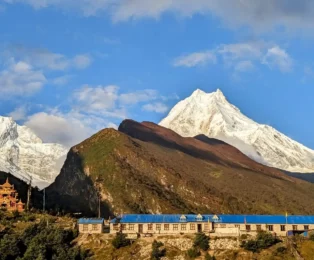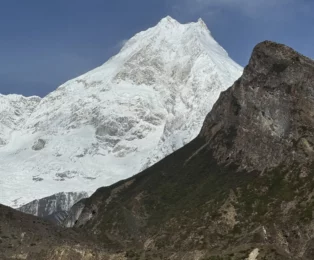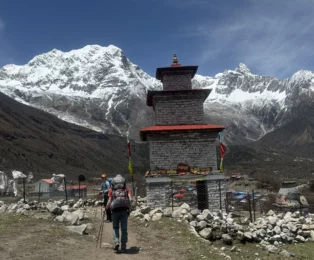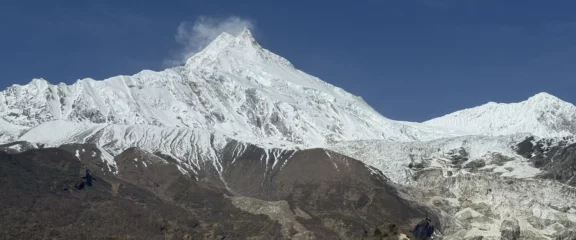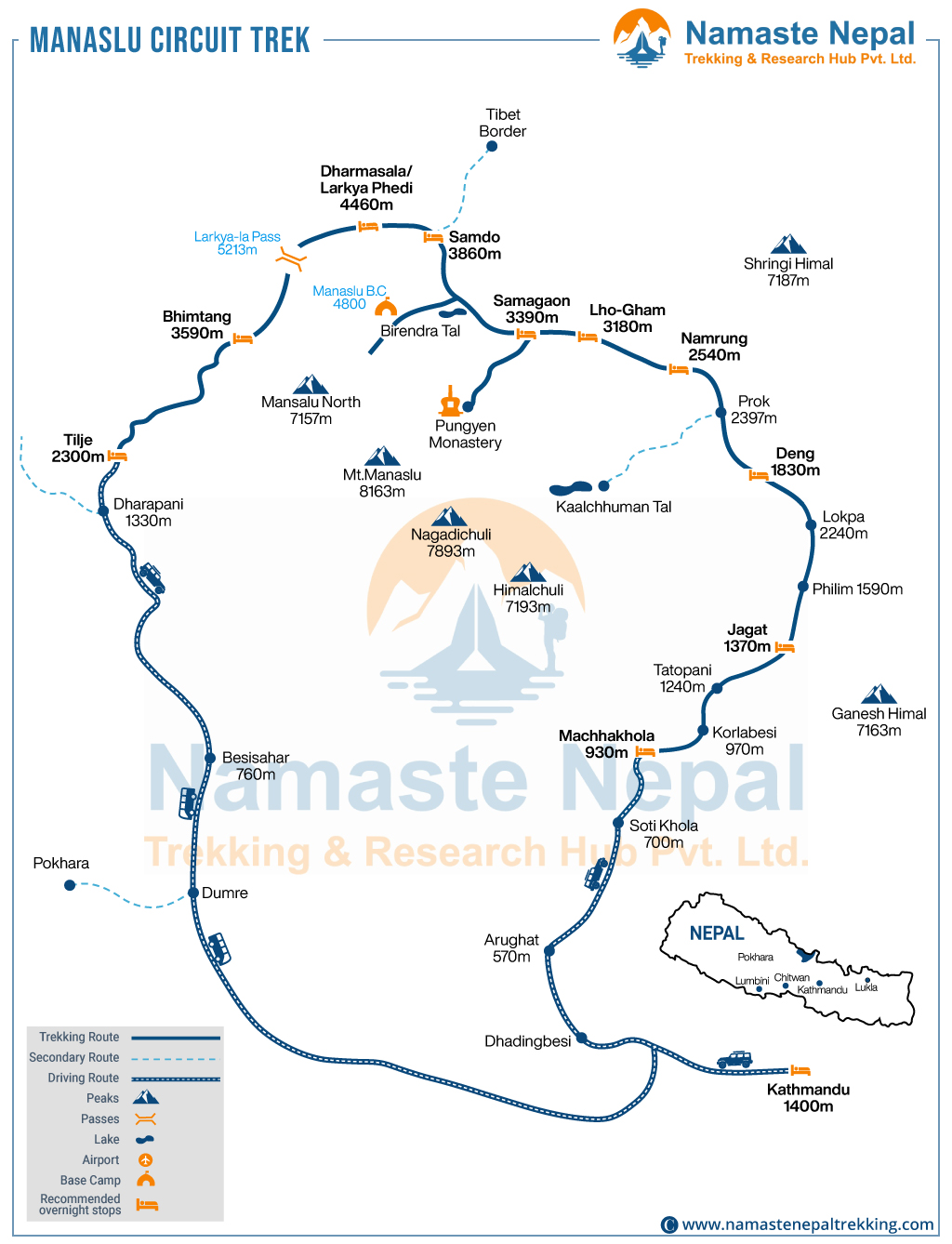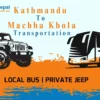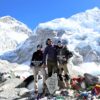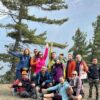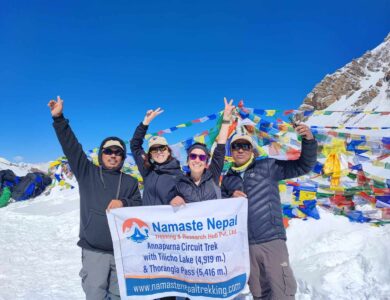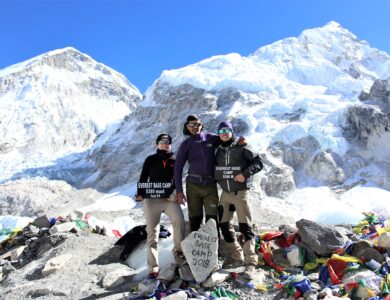Manaslu Circuit Trek - 12 Days
12 Days
Moderate
5213m/17099ft (Larke La Pass)
1-20 People People
Kathmandu / Kathmandu
Spring , Autumn and Early Winter
- 11 Breakfast
- 12 Lunch
- 11 Dinner
- Best Available Guest House
- Public Sharing Bus
- Public Sharing Jeep
- 1 - 1 personUS$ 1449
- 2 - 2 personUS$ 1249
- 3 - 5 personUS$ 1085
- 6 - 10 personUS$ 995
- 11 over 9999 US$ 945
- Your safety, our no 1 priority
- Best price guarantee
- Experienced & dedicated team
- Easy booking, no hidden charge
- You can customize this trip
US$ 1449
Major Highlights of the Manaslu Circuit Trek
- Approaching the Manaslu Base Camp and Larke la Pass, following in the footsteps of famous mountaineers.
- Visiting the remote mountain villages. Meeting people from a diversity of ethnic groups like Gurung Sherpa, Thakali, Rai, etc, and experiencing the Tibetan Buddhist Culture.
- Witnessing the raw beauty of the ice floes. Hearing the crash of the snow avalanches and the Roar of running rivers. With a new and more spectacular view day after day!
- Waking up on a crystal-clear Himalayan day and seeing 8,000-meter peaks towering over you.
- It is far less crowded than the well-known Everest Base Camp and Annapurna Circuit. The world is getting out about Manaslu, but there are still about 10 times fewer trekkers on the Manaslu Circuit trek Trail.
- Possibility of spotting a wild endangered species like Snow Leopard and Red Panda.
Trip Overview
Nepal is home to eight out of the ten highest mountains in the world. Among them, Manaslu ranks as the eighth-highest mountain in the world. Nepal is a trekker’s paradise, offering hundreds of trek routes. Each trek route will look different according to season. So, there are limitless trek opportunities in Nepal. The Manaslu Circuit Trek is one of the several treks that is becoming more and more well-liked in Nepal.
No treks in Nepal are complete without the views of mountains. Nepal is a Himalayan country known for its huge snow-capped mountains. If you have not seen any mountains, then you haven’t really seen Nepal. The Manaslu Circuit Trek is located above the Gorkha District’s foothills. You can take a local bus or hire a private vehicle to reach Machha Khola, the beginning point for the Manaslu Circuit trek, from Kathmandu.
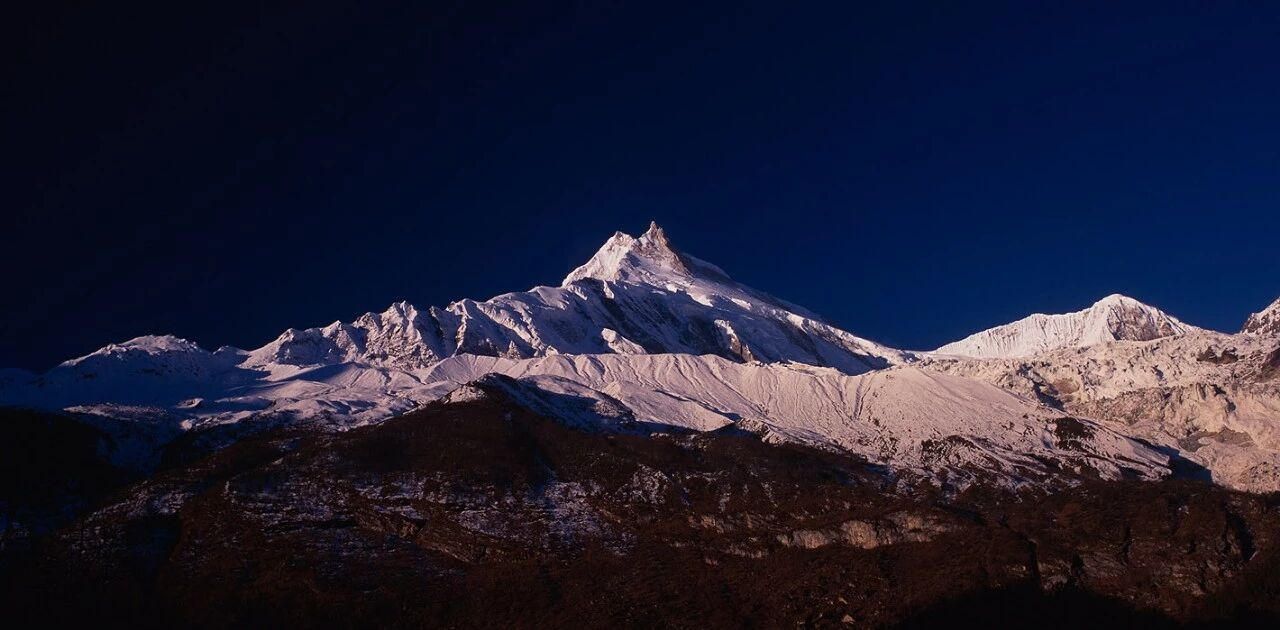
Compared to other well-known trekking locations like Everest Base Camp and Annapurna Circuit Trek, there aren’t as many travelers on the trekking trail because it’s in a remote part of the Manaslu region and the Nepali government has declared it a restricted area. The reason behind keeping this place as a restricted area is to conserve the diverse range of flora and fauna, endangered species, unique culture and traditions of people living in this region, protect the environment, and control the number of trekkers in the region.
Because of the remoteness, you might even feel that you are retreating to the past. Since scattered settlements characterize the trekking regions, it will be a place where you will witness typical culture, tradition, and even architecture.
This palace is a hidden paradise, and visitors who ever visit this amazing palace will be stunned by the untouched beauty of this region. The magnificent view that can be seen during the trip and the warm hospitality of the local people will make this trip unforgettable.
Even though this trek is located in the remote part, there are well-established tea houses on the trekking trail. So you don’t have to worry about finding food and accommodation during the trek. You will hike through thriving subtropical trees in the lowlands and stony, desolate mountains at higher elevations because of the elevation difference.
Diversities in religious beliefs also become more noticeable as you ascend. Buddhist populations are more prevalent in high elevations, whilst Hindu communities are concentrated in the lowlands. Tibetan culture has a major influence on the local Buddhist population.

The Manaslu Circuit Trek leads to Larkya La Pass, the highest point at 5,160 meters. The Larkya La Pass is Nepal’s longest mountain pass. In addition to testing your physical ability, this challenging adventure teaches you determination, dedication, and the satisfaction that comes from pushing yourself past your comfort zone.
The best part of this trek is you can witness a a jaw-dropping view of Manaslu, Annapurna, Ngadi Chuli, Himalchuli, Baudha, Pawar Peak, Cheo Himal, Himlung Pyramid, Gyaji Kung, Kang Garu and more, from the Manaslu Base Camp.
These are some of the main reasons why you should definitely try the Manaslu Circuit trek. Though this trek is challenging, it is much safer than other treks. We must be prepared in advance before embarking on this trek, both physically and mentally.
Being classified as a restricted are, you need to have a restricted permit to enter in Manaslu region. So make sure to carry a permit all the time while undertaking the Manaslu circuit trek. Along with the restricted permit, there should be two trekkers in your trekking group, and you need to have a licensed guide with you.
Economically, Manaslu Circuit Trek is one of the most economical ways to enjoy nature than Everest and Annapurna Base Camp Trek. Yet at the same time, they are no less pleasant or sometimes even more impressive than these classics.
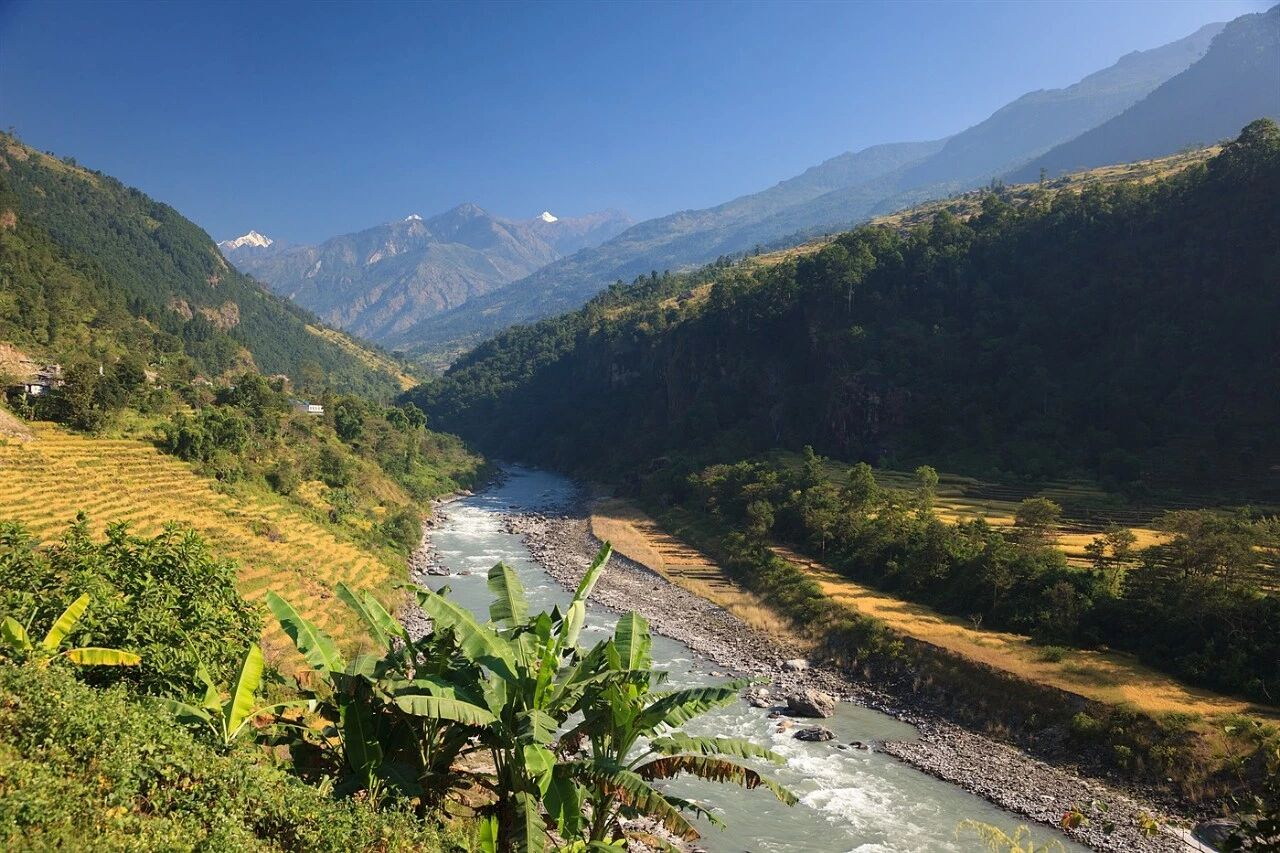
What to Expect at Manaslu Circuit Trek?
- Scenic drive from Kathmandu to Maccha Khola. The trailhead can be reached by car, so there is no need to pay for expensive domestic flights.
- Reach the stunning Larkey La Pass at 5,160m, a breathtaking mountain pass linking the Annapurna and Manaslu regions.
- Explore the rich Tibetan culture, ancient monasteries, and scenic natural wonders along the way.
- Visit iconic World Heritage Sites in Kathmandu and enjoy side trips to places like the Annapurna Circuit Trek and Tsum Valley Trek.
- Walk along the well-marked route inside the Manaslu Conservation Area, passing through lush forests, diverse wildlife, and charming ethnic villages.
- Take in mesmerizing views of the majestic Himalayas and witness stunning sunrises from various vantage points.
- Breathtaking views of the world’s highest peaks- including Manaslu mountain (8,156m), Lamjung Himal, Mt.Annapurna II, etc.
- Immerse yourself in the rural charm of the Manaslu region, away from modernization, and indulge in the tranquillity of nature.
- Enjoy the local cuisine and warm hospitality from the local people.

Manaslu Circuit Trek – Is This Trip Right For You?
Before embarking on the journey in the mountains of the Manaslu Region trekkers need to know whether this trek is suitable for them or not. The Manaslu Circuit trek requires more than two weeks to complete.
Also, you will spend nearly two weeks in the mountain region while walking for nearly 6-7 hours daily on steep uphill and downhill in narrow paths, difficult and high altitude might be troublesome for some people. This trek demands a good level of physical fitness as well. You will need at least two weeks of free time in Nepal to finish this trek.
Although there is no technical part in this trek, passing the high mountain passes like Larkes le pass (it’s 5,160 meters tall) is tough work to do. You need a high level of physical fitness and strong determination to pass this challenging mountain pass.
For the novice and the beginner, this trek might be challenging, but for the expert, it is easy and comfortable. By understanding the difficulty level, you can understand how suitable this trek is for you. So, Let’s learn how challenging it is to trek in detail below.
Note: For expert trekkers, we recommend you to check ⇒ Manaslu Circuit Trek with Tsum Valley
Understanding How Hard is Manaslu Circuit Trek
The Manaslu Circuit trek is a challenging journey, graded as Level 4 in terms of difficulty. The Higher excursion above 4500 meters and mountain pass such as Larke le Pass (it’s 5,160 meters tall) make this journey challenging. Also, during this trip, the excursion days are over two weeks. Spending such days in the remote areas of Nepal with limited facilities is not an easy task.
Let’s break down the common challenges and discuss ways to overcome them.
Altitude Sickness:
Manaslu Circuit treks take you to the maximum altitude of Larkya La, which stands at an elevation of 5,106 meters (16,752 ft). Normally, the chance of altitude sickness arises from an altitude of 3000m. So, during this trek, some trekkers face altitude sickness.
Altitude sickness can be cured easily in the initial stage. But when it turns into a severe form of HAPE and HACE, then it can be dangerous, and sometimes it can take the life of trekkers. So we need to be very careful and do treatment in the initial stage.
Unpredictable Weather:
Weather conditions directly impact the success and safety of trekking journeys. In the high altitude of the mountain region of Manaslu Region, the weather can suddenly turn from crystal clear sky to dark cloud in the blink of an eye.
Such weather conditions add to the challenge, making trail paths muddy and slippery and increasing the risk factors like getting injuries and occurring natural disasters like floods, landslides and avalanches. The strong wind and heavy snowfall make it difficult to navigate for the trekkers.
To overcome these difficulties, you need to plan. Before heading for the trek make sure to know about the weather forecast. Also, trek in the best seasons, like spring and autumn, where there is less chance of heavy rainfall, and the weather becomes stable.
Food and Accommodation:
In the remote part of the Manaslu region, you will find a cozy tea house to accommodate yourself after long hours of trekking. This tea house provides the basic facilities of meals and rooms to stay overnight. At high altitudes, due to lack of road, the essential is carried by the porter or by animals like yaks, mules and donkeys.
Even though you will get a blanket, pillow, mattress and bed sheets, it will not be clean on a regular basis like you can find in the star hotels in city areas. So, to maintain hygiene, it’s better to have your own sleeping bag.
Also, the food here is basic and limited options of international dish items are available. The food here will be basic but nutritious. Mostly you will enjoy the local food like Dal Bhat which is famous worldwide as “ Dal bhat power 24 hours”. This staple meal will fuel your body, which gives energy and nutrition required for trekking.
Further, you might not find the hot water in the washroom. The tea house will provide the hot water in the bucket, and you need to use the bucket to take a shower. Also, using the squat toilets may be unfamiliar to you if you are not used to it.
Long Duration and Distance:
Your journey starts from Machhi Khola to the ending point of the trek, Besisahar, which is approximately 177km. Walking for 4-6 hours every day to cover such a distance might be difficult, especially for beginners.
Moreover, the terrain includes steep uphill and downhill sections, which makes the journey more challenging. The long hours of exhausting walking will be fun and enjoyable if you walk if you trek in a group. Singing, dancing and enjoying every moment make the trek alive and add sweetness to your journey.
Remoteness:
Manaslu Circuit Trek is 140 km far from Kathmandu and is located in the remote part of west-central Nepal. There are no modern facilities like hospitals or airports, and it is disconnected from the urban cities. The trail paths are not famous like other trekking parts of Nepal which makes it difficult to navigate for the first time trekkers trekking in this region.
You need to learn to live with the limited amenities that are available in this region.
Heavy Backpack:
Spending a long duration in the Manaslu region means you should pack all the clothing, gear and equipment. The weather can change anytime during the Manaslu Circuit trek, so we must prepare for all weather conditions during the trek. Your porter will carry the luggage up to 20 kg. If your back weighs more than 20 kg, you need to carry it all by yourself. So, while packing, pack it wisely.
 How To Prepare Yourself For the Manaslu Circuit Trek?
How To Prepare Yourself For the Manaslu Circuit Trek?
Get a Travel Visa
All travelers traveling to Nepal for the Manaslu Circuit trek must have a visa. Most foreign nationalities, excluding some, can easily get an arrival visa after you land at the Tribhuvan International Airport (TIA). The cost of the visa depends upon the days that you will spend here.
- For 15 Days it will cost you 30$
- For 30 Days it will cost you 50$
- For 90 Days it will cost you 125$
Check out our Nepal Tourist Visa Guide (Step-by-step information for on-arrival tourist visa in Nepal) in here ⇒ http://namastenepaltrekking.com/nepal-tourist-visa-guide/
Purchase Travel Insurance
Purchasing travel insurance is mandatory while trekking in any high-altitude region of the mountains in Nepal. Trekking at a high altitude is risky. Altitude sickness, risk of injury, and unpredictable weather conditions can trigger snowstorms and avalanches, and also chance of flash floods, landslides etc, especially during the monsoon, can put the trekkers at great risk.
Therefore, it is necessary to have travel insurance before embarking on the trekking journey. While purchasing travel insurance, make sure that your insurance covers all the emergency medical services, including helicopter evacuation, flight cancellation, loss or theft or baggage.
This trek takes you to the remote parts of the Manaslu Region, so it is essential to prepare by having insurance. Not only does insurance provide financial protection, but it also gives peace of mind during the Manaslu Circuit trek, knowing that you are covered in case of emergencies.
Secure the Required Permit For Manaslu Circuit Trek
Special Restricted Area Permit (Manaslu RAP)
The government of Nepal declared the Manaslu region as a restricted area; therefore, to enter this region, you need to have a special permit. You cannot enter this restricted area unless you have a special permit along with a licensed guide and a minimum of two trekkers are required. The cost of the Manaslu Restricted Area Permit (RAP) depends on the season you are traveling in.
From September to November, it will cost you $100 per person for the first seven days and an additional $15 per person per day from the eighth day onwards.
From December to August, it will cost you $75 per person for the first seven days and an additional $10 per person per day from the eighth day onwards.
Manaslu Conservation Area Project (MCAP Permit)
The Mansalu Conservation Area starts from the Philim. While entering the conservation area in checkpoint you need to show this permit. The cost of the permit is the same throughout the year, and no additional charge for extra days.
The cost of the MCAP is $30 per person.
Annapurna Conservation Area Project (ACAP Permit)
Similar to the Manaslu conservation area, you also enter the Annapurna conservation area during the Manaslu Circuit Trek. From the checkpoint of Dharapni to the Beshishar, which is the exit point, you need to have this permit.
The cost of the ACAP is $30 per person.
Note: While trekking with Namaste Nepal you don’t have to worry about obtaining the permits which are listed above. Let us handle all the permits for you to make your trekking journey more enjoyable and hassle-free.
Learn to deal with Altitude Sickness
Trekkers should learn all the signs of altitude sickness and closely monitor their health. If any symptoms such as Headache, Nausea and vomiting, Fatigue, Dizziness or lightheadedness, Loss of appetite, Shortness of breath, or Insomnia, let your Guide know, and the first step you should do is ascend to the lower altitude.
How to Prevent Altitude Sickness During the Manaslu Circuit Trek
- Avoid rapid increases in elevation, and acclimatize well to adjust your body to altitude.
- Drink plenty of fluids, preferably water, to stay hydrated all the time.
- Maintain a balanced diet.
- Take preventive medications, such as acetazolamide (Diamox), under the guidance of a healthcare professional. It will help you to reduce the symptoms.
- Get plenty of rest
- If you experience symptoms of altitude sickness, then head to lower altitude.
- Avoid drinking alcoholic beverages and smoking during the trip.
Choose The Suitable Manaslu Circuit Trek Itinerary.
Trekkers need to choose the itinerary that fits them for the Manaslu Circuit trek. There are different trekking routes, so depending on the duration, difficulty, and scenic highlights, choose wisely. Do not attempt to shorten the itinerary in areas where there are insufficient days allocated for acclimatization. Do proper research before booking.
Read well about the itinerary days thoroughly. Make a communication with the trekking agency about your preferences, priorities, and expectations. You can also take suggestions or feedback from others so that your journey will be comfortable, memorable and more adventurous.
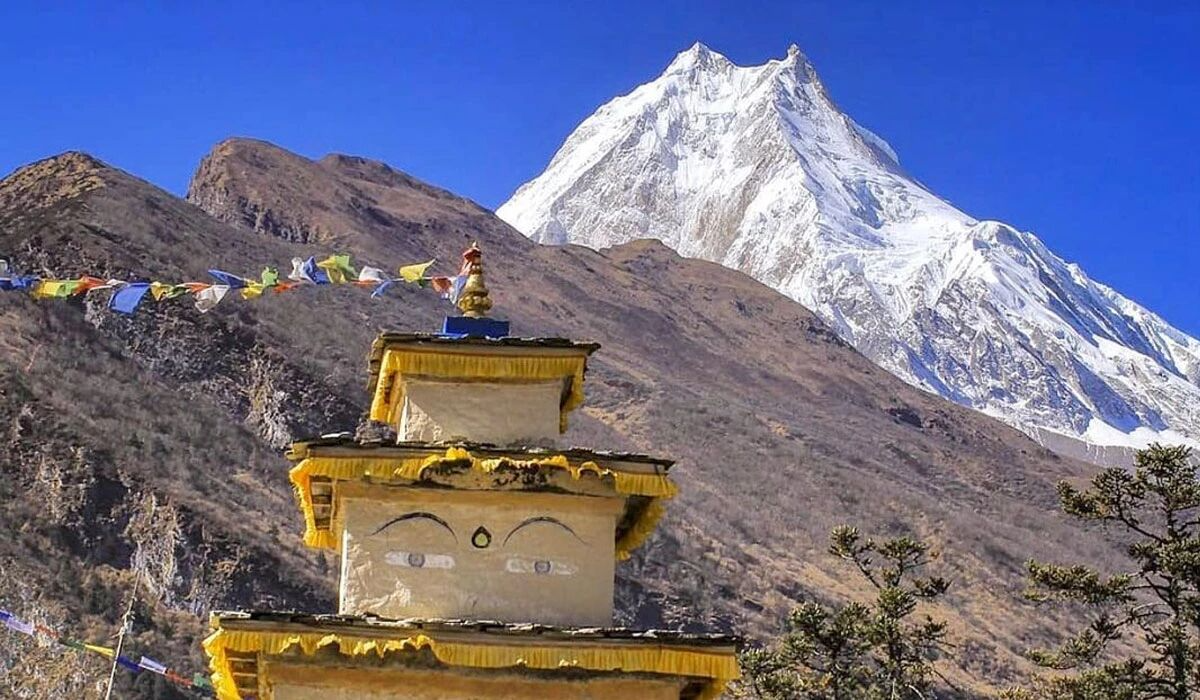
Book through a Registered Trekking agency and Hire a Guide and Porter
There are thousands of trekking agencies you can find online. The main thing that you need to look at while booking from trekking agencies is whether the trekking agencies are registered with the Nepal Tourism Board (NTB) or not. Like Namaste Nepal, an agency that is registered in the NTB, you can trust their services.
Also, you don’t have to worry about finding a professional licensed Guide for this trek. The registered company will manage to provide the Guide and Porter for you. You can also get a Guide and porter at a cheap rate in the local market/online, but you may fall into a scam. Therefore, for your safety, only trek with the reputed licensed trekking agency while undertaking the Manaslu Circuit trek.
Maintain Physical and Mental Fitness
The most important preparation that you need for this Manaslu Circuit trek is maintaining physical and mental fitness. You will be spending around two weeks in the remote areas of the mountain region. Each day, you need to walk for around 5-6 hours, sometimes more than that in the high-altitude areas.
Carrying a backpack and walking in difficult terrain might be tougher than you are thinking. It needs serious types of physical fitness. But don’t worry, there is a solution to this. With the right plan and preparation, you can achieve your dream of successfully submitting this trek. Let’s know how to maintain our physical fitness which is required for this trek.
Cardiovascular Training:
Cardiovascular training helps to maintain the health and cardiovascular systems like the heart, lungs, and blood vessels. You can do exercises like running, cycling, swimming, stair climbing, dancing, kickboxing etc. Try to add these activities to your daily routine. Start doing these activities for 1 hour daily for at least 6-8 weeks.
- Strength Training:
The main part of this training is to build a strong leg and back. You need to walk for a long hour while carrying the backpack on the steep hill. Therefore, you must build strength by doing Squats, Deadlifts, Lunges, Step-Ups, Planks, Rows, Pull-Ups/Chin-Ups etc.
Flexibility:
Engaging in flexibility exercises, such as stretching routines in the gym or yoga practice, can improve muscle elasticity, optimize joint function, and promote better body alignment, which will help to aid muscle recovery and reduce the risk of injury.
- Altitude Training (Optional):
Hiking to a nearby palace or walking to a similar altitude helps to maintain overall fitness and adapt your body to a high altitude.
Mental Preparation:
Similar to Physical preparation, it is a must to have Mental preparation for this trek. Doing meditation, setting a positive mindset and or running for long hours helps to maintain a strong mindset. It helps to deal with the challenges that you need to face during the trekking.
Pre-Trek Health Checkup:
Knowing the condition of your health before heading for the trip will be a wise decision. So have a full body checkup and follow the guidance if you have any existing health conditions.
Pack Right Clothing, Gear, and Equipment:
Having the right gear and equipment is essential for your comfort, safety, and enjoyment. Depending upon the season you choose to trek pack the gear and equipment wisely. Make sure that the clothing items fit all the seasons, as you never know. The mountain weather can change time.
- Make sure to pack all the things correctly and don’t overpack the stuff.
- Organize the list
- Focus on packing essential items first
- Be mindful of weight restrictions
- Choose a Layer of Clothing that suits all weather conditions
- Avoid packing duplicate items or unnecessary items
- Use Packing Cubes or Compression Bags
- Check the weather forecast for the duration of your trek and pack accordingly.
- Leave some space for souvenirs
- Before finalizing your packing, review your gear and clothing
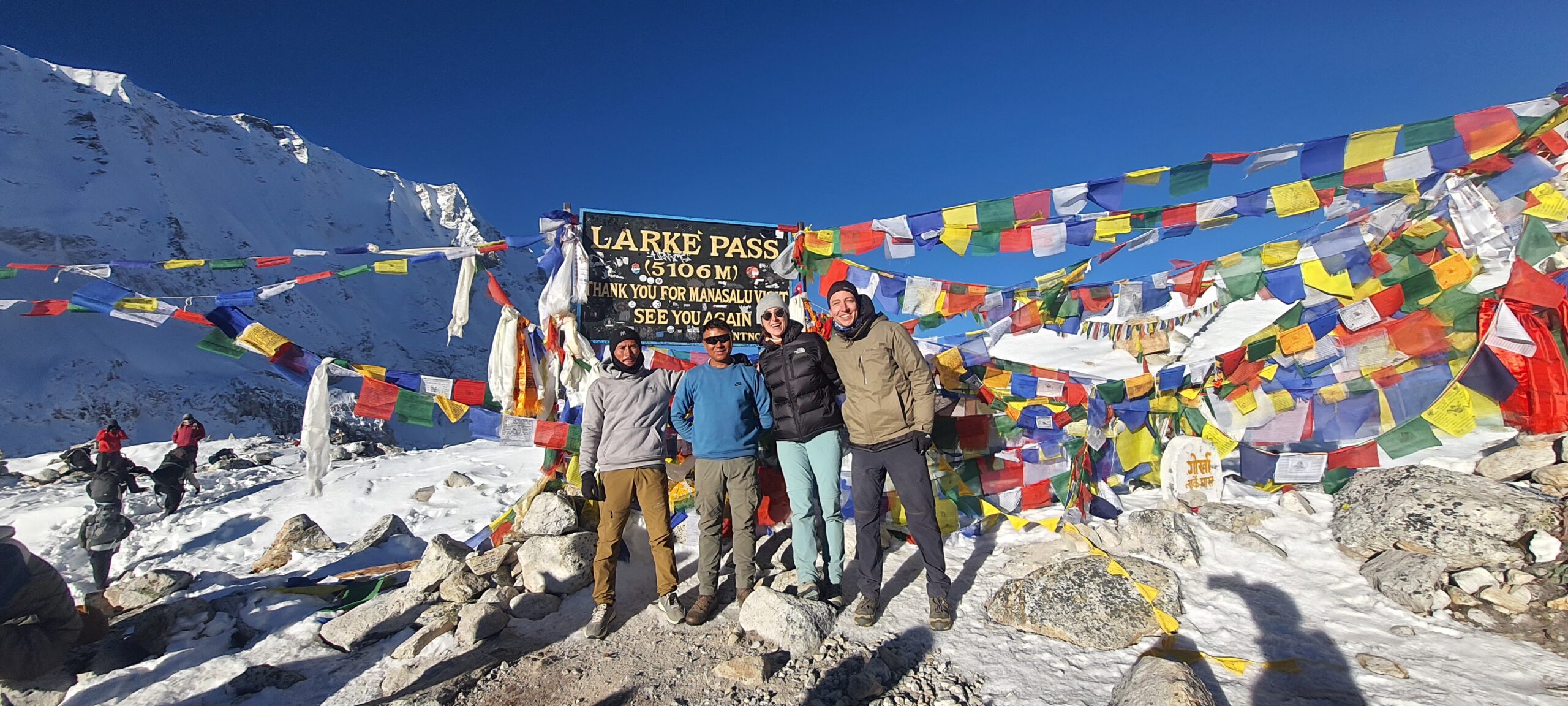
Recommended Equipment Packing List for Manaslu Circuit Trek
The following basic equipment checklists should help you with your packing. Please remember that you should always try to keep the weight of your equipment to a minimum. At the start of the trek, your packed trek bag should weigh no more than 44 pounds or 20 kg.
Sun hat or scarf
warm fleece hat
Sunglasses
T-shirts
Fleece jacket or pullover
Fleece Wind-Stopper jacket (optional)
Waterproof (preferably breathable fabric) shell jacket
Down jacket
Lightweight gloves and or
Heavyweight gloves
Under Garments
Hiking shorts
Lightweight cotton long pants
Fleece or wool pants (seasonal)
Waterproof pants
Thin, lightweight inner socks
Thick, warm wool hiking socks
Hiking boots with spare laces
Camp shoes (sneakers and/or sandals)
Sleeping bag
Headlamp
Trekking Bags
duffle bags
Basic First Aid Kit
regular medicine
Trekking Poles
Water bottles
1 medium sized quick drying towel
Tooth brush/paste
Multipurpose soap
Deodorants
Nail clippers
Face and body moisturizer
Personal Hygiene
Wet wipes (baby wipes)
Tissue /toilet roll
Anti bacterial hands wash
Reading book
Trail Map/Guide book
Journal and Pen
IPod
Pencils and small notebooks
travelling games(Uno, playing cards, dice, etc)
Outline Itinerary of Manaslu Circuit Trek
Drive from Kathmandu to Machha Khola
Trek from Machha Khola to Jagat Village
Trek from Jagat to Deng
Trek from Deng to Namrung Village
Trek from Namrung Village to Lho Village
Trek from Lho Village to Samagaun Village
Acclimatization and Rest in Sama Gaun with Side Trip to either Pungyen Gompa, Manaslu Base Camp or Birendra Tal.
Trek from Sama Gaun to Samdo Village
Trek from Samdo to Dharmasala
Trek Drom Dharmasala to Larkya Pass (5213m/17099ft) to Bhimtang
Trek from Bhimtang to Tilje Village
Drive from Taije to Besisahar to Kathmandu
Why I Advocate for the Trek to Manaslu Circuit Trek: Insights from the Founder
It’s me, Mr Rajan Lamichhane, the Founder and Managing Director of Namaste Nepal Trekking & Research Hub. As a trekking guide, I have led many groups to this trek over the decades. This trek is one of my favorite trekking trails in Nepal.
I strongly suggest the Manaslu Circuit trek as it is one of the most beautiful treks located in the remote areas of the Manaslu Region. From the breathtaking landscape, breathtaking beauty of the mountain peaks, and rich cultural experience, this trek has the potential to change your life.
I have been organizing this trek for so many years, and we have witnessed how amazing it is for people. This trek is not just about physical challenges but also helps to develop personal growth and find inner peace. And the most important part is the appreciation for nature’s wonders.
The difficulty that you overcome, the life you spent in the mountain region, the stunning view, and all the stories that we will tell to your loved ones who will be waiting for you in the home are priceless.
What I Like the Most About the Manaslu Circuit Trek
Untouched Beauty:
The Manaslu Circuit still retains its incredible beauty because it remains very natural. During the hike, you can see diverse views of landscapes like forests, fields on hillsides, rivers made of ice, and big, rocky mountains. It gives you a feeling of calm and quietness during the trek because this palace is less visited and this feeling is hard to find in other popular trekking routes.
Panoramic Mountain Views:
During the trek, you can get panoramic views of mountains like Kang Guru, Annapurna II, Himlung Himal, Cheo Himal, Nemjung, and Gyaji Kang, including the tenth-highest mountain in the world, Manaslu itself.
Cultural Immersion:
In the lower region, you can find the Hindu influence, and in the high-altitude areas, you can find the Tibetan influence of Buddhist culture. Passing through the traditional village where the homes are often built with stone houses adorned with colourful prayer flags.
Also visiting and observing different monasteries and participating in cultural events or rituals, you will enjoy typical traditions, culture, and even architecture.
Remote and Off-the-Beaten-Path:
The Manaslu trek takes you to some of the most distant and isolated villages in Nepal. Before, when people went on this trek, they had to camp out in tents for the night. But now, there are small villages along the way where you can find a place to stay. Even though these villages offer lodging, they are still quite a long way from the big cities.
Unlike more popular trekking routes like the Annapurna and Everest regions, the Manaslu Circuit remains relatively untouched by mass tourism. The trails are quieter, the villages are less developed, and the overall experience feels more authentic and off-the-beaten-path
Challenging Terrain:
The Manaslu circuit trek presents you with the tough part, like passing through mountain passes such as Larkya La Pass (it’s 5,160 meters tall). It will make you exhausted, but when you finally reach the top, the sense of accomplishment will hit you differently. It’s totally worth it.
Tea house and hospitality:
You can find tea houses dotted in the trekking trail of the Manaslu circuit trek. This tea house is owned and run by the local people living in that religion. You will be amazed by the warm hospitality of the local people.
Also, you get a chance to enjoy the traditional delicious food. Further, you will get opportunities to interact with local people and learn about their living style, their stories, cultures, and even traditions.
Buddhist Monasteries and Mani Walls:
There are numerous monasteries, chortens (stupas), and mani walls in the Manaslu region. These things hold the religious and cultural importance of local people. While visiting this place you can learn and practice Buddhist philosophy.
Why come on an Adventure with Team Namaste Nepal for your Manaslu Circuit Trek
Joining Team Namaste Nepal presents you with numerous advantages. Trekking with our team means your journey will be full of amazing adventures. We are committed to providing an excellent 24-hour 7 days a week service. Let’s see what you can expect from us while booking with us.
Expertise and Experience:
Team Namaste has been working in the trekking field for over 25 years. During this period, we have been able to provide exceptional service to trekkers. Our team is an expert in organizing and managing treks almost all over the place inside Nepal.
We have deep knowledge of the terrain, weather patterns, local culture and tradition, and we guarantee that all our visitors feel safe and have an enjoyable journey.
Professional Guides:
Our team will provide you with a local licensed professional Guide for the Manaslu Circuit trek. Local Guide will have full knowledge about the trails, flora, and fauna and will also help you to interact with the local people. Your trek will be led by the Guide who has full knowledge about the Manaslu region, insight, stories and understanding of the terrain.
Safety First:
Your safety is our top priority. Namaste Nepal ensures that you will remain safe throughout the journey. All our staff is trained on how to maintain safety during the journey, including the knowledge of first aid, mountain safety, and navigation techniques.
Customized Itineraries:
We also facilitate our customers to customize itineraries. According to your preference, time and location, you can customize it, whether you are a novice trekker or an expert in mountaineering.
Supportive Team:
Namaste Nepal team means you can get a supportive team from the day you land in Nepal to the farewell day. During the trek, you will be surrounded by a team who love exploring and discovering new things.
Cultural Immersion:
Apart from the adventurous journey, you will also get the chance to immerse yourself in the diverse culture of the Manaslu region. You will get the opportunities to interact with the local people, learn about the lifestyle of people living in the rural areas and enjoy the warm hospitality.
Responsible Tourism:
Namaste Nepal is fully dedicated to minimizing the impact on the environment by making sustainable tourism. With the help of your support, we can contribute to increasing the living standard of the local people living in the mountain region.
Memorable Experiences: Without a doubt, you will have the best time of your trekking journey, and the memory will last forever. From the beautiful landscape to the jaw-dropping mountain peak, you will feel intimately connected to the natural beauty surrounding you.
Experience the Adventure of a Lifetime at the Lap of Mt Manaslu: Mountain of the Spirit
Imagine walking in the beautiful forest, listening to the chirping of birds, seeing lovely animals, and being surrounded by the towering mountain range in the Manaslu Region. Feeling the fresh, cold air and the warm sun in your skin.
It gives you a wonderful feeling which helps you to forget all your worries and live the moment of your life. Traveling with the team, meeting new people, making friends, sharing stories, enjoying the delicious food, singing, dancing and laughing, this trek is beyond the imagination.
Reaching the top of the base camp and accomplishing the dream that you are dreaming of when it comes true will make you feel proud. It will let you feel like you are traveling to a whole other world far from the regular lifestyle.
Imagine walking through stunning mountains and beautiful forests, with each step bringing you closer to breathtaking views. Along the way, you’ll meet friendly people, share stories, and enjoy delicious food. It will give you an experience that you will cherish throughout your life.
So, get your backpack ready, tie your walking shoes, and get ready for the exciting adventure.
Manaslu Circuit Trek Cost For 2026 and 2027
The Manaslu Circuit Trek’s total cost is determined by a number of factors, including the group size, your trekking itinerary, the routes you choose, the mode of transportation you select, and the season you choose to travel.
You are able to customize the Manaslu Circuit trek itinerary to fit your budget. We advise that you do the Manaslu Circuit trek in a group since you will receive a big discount on your trekking package if you do so.
The cost of the Manaslu Circuit Trek, which varies according to the size of your group, is listed below when you select Namaste Nepal.
| Group Size | Price in USD |
| For Solo Traveller | 1449 |
| 2 Person | 1249 Per Person |
| 3-5 Person | 1085 Per Person |
| 6-10 | 995 Per Person |
| Above 11 | 945 Per Person |
| For the Special group Price | Let’s Keep in Touch |
Note: There are also last-minute bookings available for the Manaslu Circuit Trek. For additional information regarding last-minute bookings and exclusive discounts, please get in touch with us at +977 9843294000 (WhatsApp, Viber & Line) or send us an email at [email protected]. You can also come straight to our office, which is close to the Chaya Center in Thamel.
Photo & Video Gallery
Detailed Itinerary of Manaslu Circuit Trek
Day 1: Drive from Kathmandu to Machha Khola
Destination Highlights:
- Scenic drive through rural landscapes
- Trishuli River and Budhi Gandaki River views
- Glimpse of Himalayan peak from a distance
- Arrival at Machha Khola, the starting point of the trek
Our adventure begins with an early morning drive from Kathmandu to Machha Khola which is our starting point for the trek.
Your Guide will pick you up from the hotel and take you to the Bus station. The bus will depart at 7 am so you need to reach the bus station half an hour earlier to catch the bus.
The road condition until Arughat is smooth but the road conditions become rugged and rough.
The road from Arughat to Soti Khola is more challenging. But you don’t have to worry, even though the road is challenging, it is safe to drive.
During the ride from the bus window, you will see breathtaking rural landscapes, traditional Nepalese villages, and terraced fields.
We will also pass by the scenic Trishuli River where you can enjoy the rushing sound of water when we are riding.
On the way, the bus will stop for a short toilet break and lunch. Then after riding for several hours finally you will reach Machha Khola.
This small village is nestled on the bank of Budhi Gandaki River located at an altitude of 870 meters (2,854 feet). Then you will meet our other crew members who will help you the entire time on this trekking journey.
Then the porter will help you to carry the luggage bag and with the team, you will check in the tea house/lodge that we have booked for you.
Dinner will be served at the lodge. While having dinner you will also get the opportunity to meet fellow trekkers to make friends and share excitement for the journey ahead.
Then our guide will give you a short briefing for tomorrow’s itinerary so that you can prepare yourself. After that, you can have a peaceful sleep at night.
Important Notes:
- Wake up early in the morning, pack everything, and be ready before 6 am.
- Wear a mask or scarf and sunglasses because the road is quite dusty.
- Wear comfortable clothes and shoes
- Carry some snacks, water bottles and personal items
- Take a break during the drive to stretch your legs and enjoy the scenery.
Activity
DriveTrip Duration
45Distance
195kmMax Altitude
930m / 3,051ftMeals
Breakfast, Lunch, DinneAccommodation
Hotel in Machha KholaDay 2: Trek from Machha Khola to Jagat Village
Destination Highlights:
- Scenic trekking route through diverse landscapes
- Views of terraced fields and traditional Nepalese villages
- Tatopani natural hot spring
- Arrival at Jagat Village, a picturesque stop along the trek
After a hearty breakfast at our lodge in Machha Khola, we will carry our backpacks and get started on our first day of trekking.
You will start walking on the twist-and-turn road on the bank of the Budhi Gandaki River. Then following the trail you will enter the forest and while walking through the forest area you can witness many monkeys and langurs.
After passing through Khorla Besi (970 meters), and crossing a stream you will hike through the Lisyapu near the bank of Budi Gandaki.
Walking further you will reach Tato Pani, a natural hot spring situated at 990 meters. You can take a bath in this popular hot spring.
It is believed that bathing in this hot spring cures several ailments, including paralysis and skin-related problems.
After spending some time in Tatopani we will resume our trek. Crossing the swinging suspension bridge of Budhi Gandaki you will reach Dobhan via Labuchet, Thingjet, and Hulchuk.
Again hiking for several minutes you cross another suspension bridge of Dhohan Khola to reach Dobhan village.
Dobhan is a tiny village named because it is where two rivers meet: the big Budhigandaki and the smaller Dobhan River.
From Dobhan we will proceed to the Yuru Khola via Sulachet and Indur. Yuru Khola, situated at an altitude of 1330 meters, marks the next segment of your journey.
Continuing our journey towards Jagat from Yuru Khola we will cross two bridges in quick succession.
Note that a major earthquake in 2072 A.D. damaged the original trail along the Budhi Gandaki riverbank from Tatopani to Jagat. However, an alternative route exists, where crossing numerous bridges over the Budhi Gandaki stream is optional.
After leaving Dobhan we will take a break in Uiya village. In this place, you can find schools, health clinics, and a post office where you can relax and have lunch.
Then, continue walking through Bhinchet, Phaibang, Dungla, Rengbon, and Maiku on your way to Lhakpa.
You need to be careful near areas where landslides might happen, and make sure to cross two small streams along the way.
After Arriving at Lhakpa, you will continue your trek towards Jagat village which is situated at an altitude of 1410 meters. While entering the village, you must verify your trekking permits at the check post.
From this day on, you will be walking in the restricted region. You will stay in a tea house in Jagat and after having a meal we will have a peaceful sleep
Important Notes:
- Stay hydrated and maintain a steady pace throughout the trek.
- Watch your step while walking on stone stone-paved trail
- Walk carefully in the bridge
- Verify the restricted area permit at the check post (you Guide will do)
Activity
TrekkingTrip Duration
6-7 HoursDistance
20 kmMax Altitude
1,370m / 4,495ftMeals
Breakfast, Tea Break, Lunch, and DinnerAccommodation
Best Available Lodge/TeahouseDay 3: Trek from Jagat to Deng
Destination Highlights:
- Scenic trekking route with varied terrain
- Passing through picturesque villages and lush forests
- Arrival at Deng, a charming village in the Manaslu region
On this day after leaving Jagat your trek starts with a walk to Salleri and then climbs over a ridge towards Sirdibas.
This village welcomes you with lots of gompas (Buddhist temples) and colorful prayer flags fluttering in the breeze.
Along the way, you will find places where you can taste the local alcohol before you get to Phillim, a big Gurung settlement.
At Phillim, your permits will be checked before you continue along the river’s western bank.The trail is really pretty, especially with unique sculptures carved into the boulders by the river.
As you leave the river, you will walk through forests of rhododendron trees, tall Himalayan pines, and big rocks jutting out from the mountains.
As you head north towards the terrace fields at Ekle Bhatti, you will come across a steep and empty gorge.
After that, you will descend to grassy slopes with tall pine trees and eventually cross the Budhi Gandaki bridge.
Following the path along the west bank, you will pass through bamboo forests and then reach Deng Khola.
Once you cross the Deng River, you will arrive at Deng village. You will spend the night at a tea house in this village.
Important Notes:
- Maintain a steady pace and stay hydrated throughout the trek.
- Pack essentials such as water, snacks, and sunscreen.
- Respect local customs and traditions when interacting with villagers.
- Take breaks to rest and acclimatize to the altitude.
- Follow the guidance of your guide for a safe and memorable trekking experience.
Activity
TrekkingTrip Duration
6-7 HoursDistance
20 kmMax Altitude
1,830m / 6,004ftMeals
Breakfast, Tea Break, Lunch, and DinnerAccommodation
Best Available Lodge/TeahouseDay 4: Trek from Deng to Namrung Village
Destination Highlights:
- Scenic trekking route with mountain views
- Stunning views of Ganesh Himal, Mount Himchuli, and Singri Himal
- Passing through remote villages and forests
- Arrival at Namrung Village, offering cultural insights and stunning vistas
After breakfast, we will leave Deng and start today’s trek by crossing the Budhi Gandaki River.
From there the trails take us towards the Rana Gao and Bihi Phedi which has a scenic landscape. On the trail, you can see White-Faced monkeys visit villages looking for free food.
The trail then proceeds to Ghap through several landslide zones. At this point, you must be extra careful as you walk.
Plus, you must be attentive to your guide’s instructions to maintain physical safety. After the landslide zone, you will follow the trail up to Namrung.
We climb through a beautiful valley and pass by small villages and many Tibetan main walls (stone walls with Buddhist teachings carved on them) on our way to Ghap village.
Once we reach Ghap We will take a lunch break and rest for a while. Then from Ghap, we will resume walking towards Prok Village – an amazing viewpoint of Siring Himal, enjoying stunning views of Singri Himal along the way.
We walk alongside the river, crossing it multiple times as we go through a forest of firs, oaks, and rhododendrons. Finally, we will climb up a steep slope to reach Namrung(2660m).
Namrung village offers breathtaking views of peaks like Ganesh Himal, Mount Himchuli, and Singri Himal.
Namrung is also known for its great tea shops, restaurants, and places to stay along the trek. You can find a local businessman who spent many years in Hong Kong came back to Namrung and built a modern restaurant and hotel.
Now you can enjoy things like cappuccinos and WiFi here. You will spend the night at a tea house in this Namrung village.
Important Notes:
- Keep yourself hydrated all the time
- Pack all essential items such as water, snacks, and sunscreen.
- Be careful while walking at the landslide zone
- Learn to speak some Nepali words with your porter
- Follow the instructions given by your guide
Activity
TrekkingTrip Duration
5-6 HoursDistance
13.4 kmMax Altitude
2,540m / 8,333ftMeals
Breakfast, Tea Break, Lunch, and DinnerAccommodation
Best Available Lodge/TeahouseDay 5: Trek from Namrung Village to Lho Village
Destination Highlights:
- Scenic trekking route with mountain views
- Passing through traditional villages and forests
- stunning views of the wide western Himalayan ranges
- breathtaking sunrises and sunsets from Kani
- Arrival at Lho Village, offering cultural immersion and stunning vistas of Manaslu
As we leave Namrung village on our fifth day of trekking after having a hearty breakfast, the initial path gets steeper as we enter the forest.
After walking downhill for a while, we will arrive at Lihi, a small settlement with just a few houses and Buddhist shrines.
Here, we can take a short break and enjoy the mountain views all around us.
As we descend from Lihi, the trail will lead us to Simang Valley. Along the way, we will pass by a beautiful Chorten next to the Hinang River, with towering Ngadi Chuli mountain (7873m) in sight. Further walking we will reach Sho, a village with many houses.
The trail then starts to slope upwards towards Shrip. As we climb uphill, we will reach a large village called Lho.
The village is located at an altitude of around 3,180 meters (10,433 feet). Lho Village is home to several monasteries and chortens (Buddhist stupas) that hold significant cultural and religious importance.
One famous monastery here is the Ribung Gompa, located slightly above Lho Village. Don’t miss the chance to witness breathtaking sunrises and sunsets from Kani, a spot in Lho village.
The houses in this village are typically built using local materials such as stone, wood, and mud. Lho Village celebrates various religious festivals throughout the year, providing a glimpse into the vibrant local culture.
Festivals like Losar (Tibetan New Year), Saga Dawa, and Dumje are celebrated with great enthusiasm, featuring colorful ceremonies, traditional music, dance, and religious rituals.
Visitors can have an opportunity to experience the unique cultural heritage of the Nubri people. You will spend the night at a tea house in this Lho village.
Important Notes:
- Be mindful of wildlife encounters and maintain a safe distance from any animals you may encounter.
- Take frequent rests to appreciate the stunning scenery and allow your body to acclimatize to the altitude.
- Stay aware of changing weather conditions and be prepared to adjust your plans accordingly for safety.
Activity
TrekkingTrip Duration
4-5 HoursDistance
14Max Altitude
3,180m / 10,433ftMeals
Breakfast, Tea Break, Lunch, and DinnerAccommodation
Best Available Lodge/TeahouseDay 6: Trek from Lho Village to Samagaun Village
Destination Highlights:
- The breathtaking sight of Mt. Manaslu and its glaciers
- Admire views of Himal Chuli, Ganesh Himal and Peak 29 (Ngadi Chuli)
- Visit famous Ribung Gompa
- Arrival at Samagaun, a picturesque village beneath Manaslu
- Exploration of local culture and traditions
After having breakfast and soaking in the morning views of the Himalayas in Namrung, our trek begins with a steady climb uphill through the lush green forest to Lihi village. As we walk, you will start to notice that most of the locals are dressed in traditional Tibetan clothing. Along the way, we will pass through several isolated settlements like Sho, Lho, and Shyala.
When we reach Lho, you will be treated to a magnificent panoramic view of Mt. Manaslu(the eighth-highest peak in the world). We can also admire views of Himal Chuli and Peak 29 (Ngadi Chuli) to the left, Mt. Manaslu and its glacier straight ahead, and Ganesh Himal on the far right, all surrounding Shyala village.
From Shyala, it takes a little over an hour to walk to Samagaon and if time allows we will explore the famous Ribung monastery. From Samagaun, we cannot enjoy the mountain views but the sight of green grazing land, flocks of yak, and beautiful houses of locals will still capture our attention. Samagaon is often considered the most beautiful village on the Manaslu Circuit Trek. You will spend the night at a tea house in this Samagaun.
Important Notes:
- Take time to appreciate the unique culture and history of Samagaun upon arrival.
- Stay on marked trails and follow instructions provided by guides.
- Rest well for the next day’s adventures
Activity
TrekkingTrip Duration
5-6 HoursDistance
16 kmMax Altitude
3,390m / 11,122ftMeals
Breakfast, Tea Break, Lunch, and DinnerAccommodation
Best Available Lodge/TeahouseDay 7: Acclimatization and Rest in Sama Gaun with Side Trip to either Pungyen Gompa, Manaslu Base Camp or Birendra Tal.
Destination Highlights:
- Acclimatization day in Samagaun
- Optional side trips to Pungyen Gompa, Manaslu Base Camp, or Birendra Tal
- Exploration of local culture and natural beauty
Today is a day of rest and acclimatization in the beautiful village of Samagaon, where our bodies will begin to get used to the altitude.
This will enable us to tackle the higher parts of the trek successfully. Rest day means we will not rest completely but we will head on a side trip to explore one of three captivating destinations: The temples of Pungyen and Manaslu basecamp, or Birendra Tal; each one filled with its distinct attractiveness.
After enjoying the breakfast in the tea house you will have the option to choose. Then we will start our trek accordingly.
Pungyen Gompa: This excursion guides us to the ancient Buddhist monastery, called the Pungyen Gompa, which rests atop a hill that overlooks the village of Samagaon.
The Gompa is a peaceful haven, where we find sanctum in meditation and reflection, surrounded by the gentle flapping of prayer flags and offering the rocky mountains awe-inspiring views
Manaslu Base Camp: For those desiring excitement, the walk to Manaslu Base Camp is a chance to dip deeper into the magnificence of Manaslu, which is the eighth-highest peak on the planet.
The pathway not only offers an amazing and incomparable picture of the glacier and the surrounding peaks, but it also allows you to appreciate the raw beauty and nature of the Himalayas.
Birendra Tal: Otherwise, we might choose beautiful walking through Birendra Tal, which is a calm remote lake surrounded by Alpine pastureland and high peaks.
The sparkling waters of the lake turn the landscape into a mirror that gives us a beautiful place to enjoy and quiet ourselves.
No matter which option you choose, This palace will make you fall in love with the nature scene and culture of the Manaslu region.
If you want to rest without going for a side trip it is also possible. Today you will spend the night at the same tea house as yesterday.
Important Notes:
- Use the rest day in Samagaun to replenish your energy.
- Monitor your health
- Eat balanced diet food and keep your body hydrated all the time.
- You can use rest day for yoga and meditation
Activity
Acclimatization and Rest DayTrip Duration
Birendra Lake – 3Hours, Manaslu Base Camp – 7-8 HoursDistance
Birendra Lake – 3 km, Manaslu Base Camp – 12 kmMax Altitude
4,800m / 15,748ftMeals
Breakfast, Tea Break, Lunch, and DinnerAccommodation
Best Available Lodge/TeahouseDay 8: Trek from Sama Gaun to Samdo Village
Destination Highlights:
- Scenic trekking route with mountain views
- Himalayan Yak
- Samdo Peak
- Arrival at Samdo, a remote village near the Tibetan border
- Exploration of local culture and traditions
- Visit Tibetan border (4 Km)
This day of the trek is a shorter one but challenging also. The trail will run through the edge of Birendra Tal and Manaslu Glacier.
The landscape continues to change. From the lake, the trail descends towards Samdo. The trails are through the pasture of yaks.
After the fields, we will walk upwards into the juniper forests and will drop towards Samdo village.
Samdo village is a remote but beautiful village in the Manaslu region. The lifestyle and culture are widely showcased by the locals of this place.
This village is also full of Himalayan yaks. Also, we can observe the snowy Samdo Peak. Overnight at Lodge of Samdo village
Important Notes:
- There will be no WiFi or hot showers facilities available at the tea house where you will stay
- If ypu really need you Guide can arrange Hot Bucket for Shower
- Keep Monitoring your health, Let your Guide know if there any Difficuilties
- Eat and drink enough
Activity
TrellingTrip Duration
4-5 HoursDistance
5.1Max Altitude
3,860m / 12,664ftMeals
Breakfast, Tea Break, Lunch, and DinnerAccommodation
Best Available Lodge/TeahouseDay 9: Trek from Samdo to Dharmasala
Destination Highlights:
- Scenic trekking route with mountain views
- Arrival at Dharmasala, also known as Larkya Phedi
- Preparation for crossing the Larkya La Pass
Shortly after breakfast, our journey starts from Samdo to Dharamsala. The route will descend towards the Budhi Gandaki River. The bridge over the river is a link with the trail on the other side. There are a lot of mani walls in both the trails to add beauty to them.
We will then make our way through the juniper forest which follows. As we progress, we will come upon several streams of water. Next, we will go up the mountain ridge to Dharamsala.
Dharamsala is the hill station which is a popular destination in this area. There are some of the settlements that have lodges for the guests. Besides, there is also a campsite for tourists.
By the campsite, you can see many herds of goats and sheep pasturing. Snow leopards can also be spotted in this area. Overnight in one of the lodges in Dharamsala
Important Notes:
- Today’s trek will be challenging, so it’s essential to prepare mentally and physically for the demanding terrain and elevation gain.
- Pace yourself, stay hydrated, and listen to your body’s signals throughout the trek.
- Make sure to pack essential items such as water, snacks, proper clothing layers, and any necessary gear to ensure your safety and comfort during the challenging journey.
Activity
TrekkingTrip Duration
4-5 HoursDistance
6.1Max Altitude
4,460m / 14,633ftMeals
Breakfast, Tea Break, Lunch, and DinnerAccommodation
Best Available Lodge/TeahouseDay 10: Trek Drom Dharmasala to Larkya Pass (5213m/17099ft) to Bhimtang
Destination Highlights:
- Crossing the challenging Larkya La Pass at 5213m/17099ft
- Panoramic views of the Himalayas from the pass
- Descent to Bhimtang through diverse landscapes
Today is indeed a key event in our hiking journey as we successfully traverse the troublesome Larkya La Pass and advance to the scenic Bhimtang village.
This segment of the trekking is, at the same time, amazing and meaningful, providing me with breathtaking scenery of the Himalayas and the feeling of success when I am at the top of the pass.
With our alarm clock set at 3 am, we will start our day with breakfast at Dharmasala to ensure energy for the day.
We will be setting out on the trail with our headlamps turned on, the stars above us guiding our way, as we climb the steep and rocky path leading to the Larkya La Pass.
We proceed on the thin air at high altitude, the terrain getting tougher and tougher touching the watchdog in us.
In spite of the rough physical challenges, the glorious panorama of snow-capped mountains and glaciers further rekindles within oneself the striking sense of raw and natural beauty of the Himalayas.
Once we reach the Larkya La Pass at 5213 meters (17099 feet) we will gladly take a deep breath and congratulate ourselves for a job well done.
At this place, we will enjoy stunning views of the surrounding mountains among which are Manaslu, Himlung Himal, Cheo Himal and others.
Following the time of enjoyment and the ability to create memories through pictures, we will move down to Bhimtang on our decrease.
The trail zigzags through various landscapes, from the rocky slopes to the nice valleys, which are a trekker’s dream after a tedious ascent.
Going down, we will see glacial lakes, alpine meadows and thunderous waterfalls, merging into the natural beauty of the Manaslu area.
Our knowledgeable guide will be leading us, supervising that we are going down securely and carefully to the object of our journey.
We will reach Bhimtang, a wonderful village situated on the gentle hills and base of towering peaks only in the afternoon.
Here, we will check into our lodge and take some time to rest after a challenging day of trekking.
Important Notes:
- Carry the torch as you will hike early in the morning before sunrise.
- Start early to maximize daylight hours and avoid potential weather challenges at higher elevations.
- Dress in layers to adapt to changing weather conditions, including cold temperatures and potential wind chill at the pass.
- Stay hydrated and nourished throughout the trek to maintain energy levels and aid in altitude acclimatization.
- Exercise caution while descending from the pass, as the trail may be steep and rocky in places.
- Follow the guidance of your guide for a safe and successful crossing of the Larkya La Pass and descent to Bhimtang.
Activity
TrekkingTrip Duration
9-10 HoursDistance
16 kmMax Altitude
5,212m / 17,100ftMeals
Breakfast, Tea Break, Lunch, and DinnerAccommodation
Best Available Lodge/TeahouseDay 11: Trek from Bhimtang to Tilje Village
Destination Highlights:
- Scenic trekking route through diverse landscapes
- Passing through picturesque villages and terraced fields
- Explore Gurung culture and traditions
- Arrival at Taije, marking the end of the Manaslu Circuit Trek
We’re going to begin our hike, waking with the morning sun over snowy peaks from a misty Bimthang. The way goes gently through beautiful pine and rhododendron forests as we leave the town and follow a river of ice blue that starts to flow.
We move on with Dudh Khola, a silver-flowed river with water running fast and clear. We accomplished the task and arrived at Soti Khola for a lunch break.
The pathways are considerably sloped to the Banks of the Dudh Khola. The only thing harder than the climb is bidding goodbyes to the vibrant greenery along the way.
By the time we reach Karche, exhaustion seems to disappear and all of this hard work certainly is worth it. After the Karche, we will arrive at another area which had been blocked by a landslide.
Walking again across the landslide-prone area, we will be back to a steep way once. Some will be ascending while others will be descending that will along the Gho village line.
After that, we will pass through the Gho forest which changes into a thick forest of Rhododendron and Oak and ultimately lead us to the village of Tilije.
Tilije is a settlement where tribes of Gurung people live. In the same way, our tour can involve observation of Gurung culture and living styles.
Important Notes:
- Stay hydrated and take breaks as needed during the trek.
- Be mindful of steep descents and uneven terrain on the trail.
- Listen to your body and pace yourself to avoid exhaustion.
Activity
TrekkingTrip Duration
5-6 HoursDistance
20 kmMax Altitude
2,300m / 7,546ftMeals
Breakfast, Tea Break, Lunch, and DinnerAccommodation
Best Available Lodge/TeahouseDay 12: Drive from Taije to Besisahar to Kathmandu
Destination Highlights:
- Scenic drive through rural landscapes and picturesque villages
- Return journey to Kathmandu, marking the end of the trekking adventure
- Farewell dinner at the traditional Nepali Restaurant with cultural profromence
The trekking journey ends in Taije. We will say farewell to the Guide and the porter who helped you through your entire trekking journey.
After breakfast today, we will take a jeep to Besi Sahar. After a short break there, we will hop back into the vehicle and continue driving to Kathmandu, concluding our Manaslu Circuit Trekking adventure.
On the way back to Kathmandu along the Prithvi Highway, we will pass by the confluence of the Marsyangdi River and the Trishuli River.
The scenic drive offers views of terraced fields and towering hills, allowing us to enjoy the natural beauty of the area.
Once we reach the bustling capital, you can freshen up and relax in the hotel. In the evening, you can stroll in the streets of Thamel.
Thamel is the central hub for tourists. Here you can find unlimited shops, restaurants, spas, malls, cafes, dance bars, and many more. To celebrate the successful completion of your trekking journey the farewell dinner will be served at the traditional Nepali restaurant with a cultural performance.
Important Notes:
- Take breaks at scenic viewpoints to stretch your legs and capture photos.
- Be patient and flexible
- Check your return flight status
- Inform us for additional services you may need for your rest stay in Nepal
Activity
DriveTrip Duration
8-9 HoursDistance
200 kmMax Altitude
1,400m / 4,593ftMeals
Breakfast, Tea Break, Lunch, and DinnerAccommodation
Available on RequestWe’ve carefully designed our Manaslu Circuit Trek itinerary to ensure you stay healthy and relaxed by climbing slowly to help you acclimatize properly. This way, you can truly enjoy the stunning beauty of the Himalayas without feeling rushed or worrying about altitude sickness.
We want you to have plenty of time to take in the amazing landscapes and experience the rich local culture at your own pace. If you’d like the convenience of private transportation to Machhakhola and from Taije, we can arrange that for you at an additional cost.
Also, if you’re interested in spending extra days around the beautiful areas of Samagaun and Samdo, just let us know in advance. We’ll happily adjust the plan to give you the best experience possible!
Build Your Own Adventure!
Collaborate with our specialists to create a unique itinerary.
Cost Breakdown for Manaslu Circuit Trek Package: Clear Details for Better Planning
- All Airport hotel transfers by private vehicle
- Kathmandu to Machha Khola by Public Bus
- Dharapani to Beshishar by Public Sharing Jeep
- Besisahar to Kathmandu by Public Sharing Bus
- All the accommodation during the trek
- All the meals (Breakfast, tea break, lunch, and dinner) will be served with seasonal fruits during the trek.
- All necessary paperwork and Manaslu Circuit Trek Permits
- Manaslu Restricted Area Special Permit
- MCAP (Manaslu Conservation Area Permit)
- Chumnubri Rural Municipality Permit
- ACAP (Annapurna Conservation Area Permit)
- TIMS (Trekkers Information Management System)
- All government and local taxes
- The farewell dinner in Kathmandu
- An experienced English-speaking trekking guide,
- Assistant trekking guide (1 assistant trekking guide for every 10 trekkers)
- And Support staff/Sherpa porters (1 support staff for every 2 trekkers), including their salary, insurance, equipment, transport food, and lodging
- Nepal visa fee (Lowest fee available for 15-day visa costing $30/person)
- International airfare to and from Kathmandu
- All accommodating in Kathmandu (if in case early return from the mountain then the scheduled itinerary)
- Travel and rescue insurance
- Personal expenses (phone calls, laundry, bar bills, personal drinks, battery charge, bottle or boiling water, hot shower, wifi and or internet etc)
- Meals in Kathmandu
- Tips for guides and porters
Book your Manaslu Circuit Trek today and enjoy the following Complimentary Services with Your Trip.
- Personalized virtual consultation before finalizing your Manaslu Circuit Trek booking.
- Online Pre-Trip Briefing after booking confirmation
- Free excess luggage storage facilities at our office store
- Namaste Nepal’s duffle bag
- Namaste Nepal’s T-shirt / Baseball Cap
- Trekking map
- Trekking Pools (to be returned after completion of the trip).
- Down jacket and seasonal sleeping bag (to be returned after completion of the trip).
- A self-sufficient medical first aid kit containing vital medications.
- Oximeter to check your pulse oxygen saturation and heart rate twice daily (Very useful to check AMS symptoms)
- Hand sanitizer
Addons & Options for Manaslu Circuit Trek
Addons
Price
Private Jeep from Kathmandu to Machha Khola
US$ 190
Upgrade your journey to the beginning (Machha Khola) of Manaslu Circuit Trek with a private jeep from Kathmandu. Enjoy a smooth, comfortable ride through scenic landscapes, avoiding long Local Bus journeys. This hassle-free option ensures flexibility, privacy, and a more enjoyable start to your adventure.
Private Jeep from Dharapani to Besisahar and to Kathmandu
US$ 200
End your Manaslu Circuit Trek with a smooth and comfortable private jeep ride from Dharapani to Besisahar and onward to Kathmandu. Avoid long, bumpy bus rides and enjoy a hassle-free journey through scenic mountain roads, ensuring a relaxing and convenient return.
Airport Pickup/Drop in Kathmandu
US$ 10
Enjoy a hassle-free arrival and departure with our private airport pickup and drop service in Kathmandu. Travel comfortably in a private vehicle with a professional driver, ensuring a smooth start and end to your Nepal adventure.
3-Star Hotel in Kathmandu with Breakfast (Double)
US$ 45
Stay in a comfortable 3-star hotel in Thamel, Kathmandu with a cozy double room and complimentary breakfast. Enjoy modern amenities, excellent service, and a convenient location—perfect for relaxing before or after your adventure.
Full Day Sightseeing tour of Kathmandu with Tour Guide
US$ 80
Explore Kathmandu’s rich history and culture with a full-day guided tour. Visit UNESCO World Heritage Sites like Swayambhunath, Pashupatinath, Boudhanath, and Kathmandu Durbar Square. Enjoy expert insights from a professional guide for an unforgettable experience.
Manaslu Circuit Trek - 12 Days Altitude Chart
Trip Departure Dates
Additional Information about the Manaslu Circuit Trek
Accommodation in Manaslu Circuit Trek
Even though camping is possible for the Manaslu Circuit trek most people love to stay in the tea house. Staying in the tea house is a great place to accommodate yourself during the trekking journey. In most of the tea houses, you will find a twin-sharing room and a common toilet.
It’s common to expect squat types of toilets, especially in the mountain region. Additionally, inside the room, there will be two single beds with mattresses, pillows, and warm blankets, which will be a clean and cozy room. A comfortable setup will be made for the trekkers.
Remember that there will be no room heating system available in the tea house. Wear warm clothes to protect you from the cold. Even though the tea house provides a warm blanket, having a sleeping bag will be the best idea to beat the cold at night. There is a common place for dining and relaxing, where you can keep yourself warm by staying around the fire at night.
While at the lower altitude, it is possible to have a single room with attached bathrooms with little extra payment. But at the high altitude, it is not possible to find a single room due to limited tea houses available, and also, the facilities will be limited.
During the peak seasons, it’s very hard to find a single room, so we suggest you book earlier and tell us in advance if you want a single room. You need to pay the extra charge for the single room.
Not only the food and accommodation service is provided by the tea house. You can also get connected to the internet, hot shower and electric charging facilities. After paying a little extra, you can use this facility while staying in the tea house.
During the trekking journey, you will stay in the tea/guest house in Dharmasala or Larke Phedi, which is the last stop before crossing the Larke La Pass. There are only two guest houses in this place: Jambala Guest House and Dharmasala.
In this tea/guest house, there are no facilities for wifi and showers. Except for this place, you can find the facility of hot showers and wifi in all the tea/guest houses.
Food Available in Manaslu Circuit Trek
Three meals; breakfast, lunch and dinner are provided during the Manaslu Circuit trek trekking journey which will be included in the package. Although there is not a wide selection of food options available like in the city, the food that you will get here is nutritious and healthy.
The food provided during the Manaslu CIrcuit trek is carefully designed to fuel trekkers’ which is required for the journey. Most of the food available in the tea house is (Indian, Chinese, Italian, Continental, Tibetan, etc).
Here are the common dishes that you can find in the tea house during the Manaslu Circuit trek journey.
Breakfast:
The serving time of the breakfast is usually between 6–10 am. It will give you the energy you need to start your day on the trails.
Hearty Breakfast Set: This set is a combination of toast, chapati, or Tibetan bread paired with hash brown potatoes, a boiled or omelet egg, and your choice of hot beverage (tea or coffee).
Tibetan Bread: A favorite among hikers in the Himalayas, Tibetan bread is a flatbread that’s deep-fried and topped with peanut butter, jam, or honey. You can also add cheese or eggs for extra flavor.
Pancakes: If you are craving something sweeter, indulge in a variety of pancakes such as plain, chocolate, or banana. These pancakes are served with toppings like peanut butter or honey, perfect for a tasty treat.
Cereals: For a lighter option, try muesli, cornflakes, or porridge topped with fruit and your choice of milk or yogurt. It’s a healthier alternative if you’re looking for something different from bread and pancakes.
Paratha: An Indian flatbread filled with potatoes, eggs, or vegetables, usually served during breakfast. It’s a flavorful and satisfying option to fuel your trekking adventure.
Simple Choices: If you prefer something simpler, you can opt for French toast, vegetarian soup, or eggs prepared on their own. These straightforward options are still delicious and provide the fuel you need for the day ahead.
Lunch and Dinner
You can eat lunch between 10 am and 3 pm, and dinner will be served in the evenings from 7 to 9 pm.
Dal Bhat: The staple meal of Nepal’s society, Dal Bhat consists of white rice (bhat) served with lentil soup (dal), along with pickles, salad, and seasonal vegetables. Non-vegetarians can enjoy it with chicken or mutton curry, while vegetarians have a side dish of veggie curry.
Momo: A beloved Nepalese dish, momo is a steamed dumpling available in both vegetarian and non-vegetarian varieties. It’s a popular choice among trekkers and widely available along the Himalayan routes.
Thukpa or Thentuk: This noodle soup is a comforting option for lunch or dinner, with variations such as thukpa (thin, long noodles) or thentuk (flat, square-shaped noodles). It’s served hot and hearty, perfect for chilly weather.
Chowmein or Noodles: Tea houses along the route offer chowmein, a unique Nepalese noodle dish that’s quick, light, and flavorful. You can also opt for instant noodles for a convenient and satisfying meal.
Fried Rice: Fried rice is a popular choice for lunch or dinner, featuring cooked white rice mixed with vegetables, eggs, or meat. It’s a tasty and filling option for trekkers on the Annapurna Base Camp Trail.
Rice and Curry: If you prefer a simpler meal than Dal Bhat, you can opt for rice served with a basic chicken or vegetable curry.
Pizza: While not as common as traditional Nepalese dishes, you can find pizza available at restaurants located at lower altitudes. However, quality may vary.
Pasta or Spaghetti: Another option available in the lower sections of the trek is pasta or spaghetti seasoned with tomato sauce, vegetables, meat, or eggs. It’s a comforting and familiar choice for those craving a taste of home.
Hot Drinks:
Tibetan tea, milk tea, black tea, mint tea, ginger tea, lemon tea, and green tea are the options available to you. You can also get a black coffee or milk.
Soft/Cold Drinks:
A variety of soft drinks such as Coca-Cola, Fanta, Sprite, and Pepsi, as well as canned juices and energy drinks, are easily accessible along the trekking route.
Alcoholic Beverages:
You can find a limited selection of recognized brands, as well as plenty of locally brewed raksi, available in this area. However, we don’t advise you to drink the alcoholic beverage as it might increase the chance of altitude sickness.
Best Time for Manaslu Circuit Trek
It is important to know about the season for trekking while planning for the Manaslu Circuit trek. The optimal time for trekking in the Manaslu Region is spring (March, April, or May) and autumn (September, October, and November). This season is also known as peak season due to stable weather, moderate temperature, less perception of rainfall and a clear view of the sky, making it perfect to see the panoramic view of the mountain peak and surrounding landscape.
Here is the breakdown of each season in detail
Manaslu Circuit Trek In Spring (March, April, or May) Season
Spring is a season of blooming. You can find greenery everywhere, like a blanket covering the lush hill. In high altitude areas, the forest is covered with the blooming of different colors of rhododendron flowers and walking inside the forest with vibrant colors will give an unimaginable experience.
The early part of March is still chilly in the morning and the evening, and the temperature gradually increases in April and May. The warmer temperatures during the daytime and long sunshine hours make comfortable trekking conditions.
Also, the clear view of the sky and excellent visibility with the stunning view of the majestic towering will enhance your trekking journey. Nepali New Year also falls in the spring season.
You can enjoy the big festivals Losar (Tibetan New Year), Bisket Jatra, and Buddha Jayanti which add cultural experience during the trek. Spring is also the best time to explore the different species of plants and animals in the conservation area.
Also, passing the Larkya La Pass, which is one of the difficult sections of our trek, is easier during the spring season. Tea houses will fully operate during this month and you can enjoy this Manaslu Circuit trek with other trekking enthusiasts like you.
Manaslu Circuit Trek In Autumn (September, October, and November) Season
Autumn is widely popular for trekking in Nepal in part of the mountain region. Likewise other trekking places, it’s an ideal time to trek in Manaslu Circuit due to stable weather conditions, moderate temperature, clear view of the sky, good visibility and less chance of rainfall.
After the heavy rainfall washes away the remnants of the summer, the transformation of the Manaslu region in the autumn is amazing. The cool and fresh air from the mountain and the leaves of trees turning yellow make it look like everything is turning golden even the mountain seems like a golden peak.
The biggest festivals of Nepal, Dashian and Tihar, also fall in this season. All the local people go to their homes to get the blessing from their elders. You will get the opportunity to have celebrations with local people and enjoy the pure Nepali culture and traditions.
From the panoramic view of the majestic mountain to the chance of learning the culture and traditions of local people you can find a large group of trekkers in the trekking trail path. We suggest you book the accommodation earlier as it may be difficult to find in the peak seasons due to overcrowding.
Manaslu Circuit Trek In Summer (June, July, August) Season
Summer, which spans from June to August, is also called the off-season in Nepal for trekking. Due to the heavy rainfall and the risk of natural disasters such as flash floods, avalanches, and slippery trails, we advise not to undertake the Manaslu Circuit trek during the summer season.
Also, the slippery and muddy road conditions can cause roadblocks and make it difficult to reach the destination on time. Also, the poor visibility due to a sudden change in the temperature can distract from getting the perfect view of the mountains. Mainly due to significant danger and a high chance of getting injured, it’s best to skip this season.
Manaslu Trek In Winter (December, January, February) Season
Winter, which spans from December to February, the nights and the morning are chilly. The temperature drops below -10 to -15 degrees Celsius, especially at night time. At the high altitude, the heavy snowfall makes the trail path covered in the snow and it makes it difficult to walk and navigate.
Also, during the month of winter, the sunset very early makes it difficult to reach the destination in time, which adds to the difficulty during the trek. Also walking with the heavy equipment and more clothing layer in the icy path is very tough.
If you don’t protect yourself from cold, then getting ill from cold temperature is high, and also, when you are exposed to the cold, you can get frostbite. Further, crossing high mountain passes such as the Larkya La Pass can be particularly challenging during winter due to snow and icy conditions.
Likewise, similar to the summer, we suggest you not do the Manaslu Circuit trek during the winter due to unfavorable temperatures and weather conditions. Even if you trek, make sure to prepare well and pack all the gear and clothing equipment.
Our Trekking Team for Manaslu Circuit Trek
Namaste Nepal Trekking team is a group of friendly and experienced people who are here to ensure you have a safe and enjoyable journey. There will be one expert trekking leader/guide, one assistant trekking guide (one for every seven trekkers), and support staff/sherpa porters (one for every two trekkers) to ensure your ideal journey is successful.
These arrangements will make sure that if anybody in the group gets any issue (emergency return, altitude sickness, physical damage, sickness, etc.) in the middle of the Manaslu Circuit trek and can’t continue, the rest of the group can still go ahead as planned as to the destinations. We have knowledgeable guides who know a lot about the Annapurna Region.
Porters will carry the heavy stuff so you can enjoy the beautiful views. We also have a support team to handle all the planning, like where to stay and getting the right permits.
Safety is important, so we have equipment and trained staff for emergencies. We care about the local communities and the environment. We aim to give you a fantastic and responsible trekking experience in the amazing Himalayas.
Electricity, Drinking water
During the Manaslu Circuit trek, almost all the tea houses provide you with facilities for drinking water and electricity for charging the electric appliances. Do not completely depend upon the tea house for the electricity. It will be a smart move to carry the power bank for charging your device.
Tea houses also sell drinking water, but it might be expensive, and using plastic bottles will hamper nature. We advise you to carry the 2 reusable water bottles. You can refill the bottle from the natural source as well as from the tap. Tap water and natural sources are not completely safe as they might contain some unseen waterborne bacteria. Therefore, carry some water purification tablets with you.
Communication and Internet
During the Manaslu Circuit trek, for communication, you can use the local sim, which you can easily purchase from the Tribhuvan International Airport(TIA). Also, you can use the sim for the mobile internet which can reduce the cost that you need to pay for the wifi.
If you want to use the wifi it is also possible because all the tea houses are equipped with the wifi nowadays. After paying the certain amount which is charged by the tea house, you can use it, but the connection might not be strong due to high-altitude.
Tipping
The Manaslu Circuit trek is a wonderful adventure, made possible by the contribution of local guides, porters and support workers. Tipping is a way to appreciate the services rendered and also to support the local economy.
The exact number may vary based on personal satisfaction and budget, but even a tiny act can be quite a huge gift to those who have literally carried you forward through your journey. Tipping at the end of the ride is not only a way of saying “thank you” but also helps to keep the community friendly and thriving.
Trip Extension
After you complete the Manaslu Circuit trek and wish to further explore the region, it is also possible. We will make the necessary arrangements for you. Here are some of the best places that we recommend to visit after you complete the Manaslu circuit trek;
- Continue to Annapurna Circuit Trek from Dharapani
- Add Tusm Valley Trek on your Manaslu Circuit Trek
- Serang Gompa (3100m, 10170ft.)
- Kal Tal, meaning ‘Death Lake’ (3600m, 11808ft.)
- Hinang Gompa and Himalchuli Base Camp (4020m, 13186ft.)
- Phungen Gompa (Around 4050m, 11316ft.)
- Birenda Tal (3450m, 11316ft.)
- Manaslu Base Camp (4900m, 16072ft.)
- Rui La, Nepal –Tibet border (4998m, 16593ft)
You can also go sightseeing in Pokhara for adventurous activities like paragliding, rafting, hot air balloon, etc, or cultural or heritage tours. You can also visit the birthplace of Lord Gautam Buddha or Chitwan National Park for Jungle Safari. The choice is yours; you will have unlimited options for enjoyment.
Arrival and Departure Info
After you fix the Manaslu Circuit trek trekking journey on the date of arrival our staff will be there to pick you up from the airport. We will arrange the transportation facility for you. For any information, you can use the number which is provided on our website. From the arrival date to the departure, we will arrange everything for you, like permit, Guides, transportation, etc, as per the itinerary.
Frequently Asked Questions
Booking and Travel Arrangements
How to Book the Manaslu Circuit Trek?
For booking Manaslu Circuit Trek, first read all the itinerary details, things included and excluded in the package and most importantly, do well research.
After that, you can fill out the form that you can find on our website. You can even call or message us for booking.
To confirm the booking, you need to send us the digitally scanned copy of your passport, Passport Photograph and 25% of the total package for the arrangement of your trek. The rest of the payment can be made after you arrive in Nepal.
Is the departure of my Manaslu Circuit Trek trip guaranteed?
Yes, your Manaslu Circuit trek trip is guaranteed to depart when you book your trek with Namaste Nepal. We ensure that all scheduled departures will proceed as per your plans date you choose to travel.
In the event of unforeseen circumstances such as political disturbances, climatic emergencies, epidemics, etc., beyond our control, we may need to postpone the trip.
However, rest assured that we prioritize your safety and will make every effort to reschedule the trip as soon as possible.
What if I cancel the Manaslu Circuit Trek? What is your cancellation policy for Manaslu Circuit trek?
We know unexpected things can happen at unexpected times.
If something unfortunate happens and you need to change your plans, you can write us an email or message us.
If you give us enough time, we will assist you.
We can postpone your trip and apply your advance payment for any time in the future.
The fund transfer process from Nepal to another country takes a long time because we need to prepare all the documents and get permission from the Central Bank of Nepal.
That’s the main reason we encourage all of you to postpone the trip and use the credit in the future.
If you need to cancel your trip completely, we, unfortunately, are unable to give you a full refund. You will be charged 30% of the package price as a cancellation charge.
Can I customize the Manaslu Circuit trek?
We definitely offer the facilities for our customers to customize the trip depending on their interests and what they seek during the trek.
For this, you need to contact us so that we can plan with our expert team to make your journey more comfortable and adventurous as per your needs.
Are there any extra costs that I have to prepare on top of the Manaslu Circuit trek package price?
In this Manaslu Circuit trek package, you will find that most of the things are included. However, we suggest you estimate $ 10 to $15 per person per day as your miscellaneous expenses.
Following are the major expenses that are extra on top of the package price.
Lunches and Dinners in Kathmandu and or before starting the trek:
Except for the farewell dinners in Kathmandu, your lunch and dinners are not included; from the day you start the trek, everything will be included; check your quote to see which meals are included.
Drinking Water:
Drinking water for your entire trip is not included in our package. We are an Eco-friendly Trekking Company; we encourage you to keep mountains safe from garbage and use reusable bottles and water purification tablets.
Other Drunks:
Every meal included in the Manaslu Circuit trek itinerary comes with a cup of tea or coffee; apart from that, any of your hot/cold drinks will be your own.
Overweight backpack:
NNTR provides 1 support staff for every 2 trekkers; if one of your backpacks weighs more than 20 kg combined, you will need to pay a bit extra to compensate your porter or get another porter.
Tips for your guide and support staff:
Tips for your guide and support staff are not included in the package. Please plan accordingly to show your appreciation for their hard work and dedication.
Optional extra expenses on your guesthouses:
Nowadays, most of the famous trekking trails of Nepal have got internet and electricity asses. It is normal for guesthouses to charge extra for wifi and battery charging, and most of the guesthouse offers hot showers (or hot buckets), you will have to pay extra for these services.
Do I need to get Trekking Permits for Manaslu circuit trek?
Yes, you need to carry the permit while trekking in the restricted area of Manaslu region.
But it’s our job to provide Manaslu Circuit Trek Permit for you. – So, Leave it to us!
Every trekker who wants to do the Manaslu Circuit trek around the Manaslu region of Nepal needs to get 3 different permits.
- Special Restricted Area Permit for Manaslu (Manaslu RAP)
- The Manaslu Conservation Area Project Permit (MCAP Permit)
- The Annapurna Conservation Area Project permit(ACAP)
For the cost of these permits and complete information about the permit-obtaining process and requirements, please visit our recent blog.
How much does the Manaslu Circuit Trek cost?
The overall cost of the Manaslu Circuit trek depends upon several factors, such as the number of days, the season you choose, transportation, food and accommodation, etc.
Normally, the cost of the Manaslu Circuit Trek ranges between $900 to $1800 per person.
Remember that travel insurance, international airfare, personal expenses, tips, etc., will not be included in the trekking agency’s package.
How much money should I carry for the Manaslu circuit trek for my extra expenses?
Most of the things will be included in the Manaslu Circuit trek package. However, we suggest you carry some money in Nepali Rupees of about 15,000-30,000.
It will help you to purchase items like snacks, drinks, souvenirs, or additional services not covered in the package.
You can also donate some money in rural areas if you wish to do so. Additionally, having some extra cash can be useful for unforeseen expenses or emergencies during the trek.
Is there access to banking facilities or ATM services along the trekking trail of Manaslu Circuit trek?
The banking facilities and atm facilities are accessible only in the major city areas.
Even though there are some atm services in the low-altitude area of the Manaslu Region, they may not be working.
Therefore, we suggest withdrawing cash while you are in city areas like Kathmandu before you start your Manaslu Circuit trek trekking journey.
Preparation and Fitness
Can I do a solo trek for the Manaslu circuit trek?
You cannot get the special permit on your own, and the government of Nepal bans solo trekking in the restricted areas of Nepal.
Because the Manaslu region is designated as a restricted area, you are unable to complete the Manaslu Circuit trek alone. A minimum of two trekkers, including one certified guide, are required to complete the Manaslu Circuit trip.
This rule is implemented for the safety of trekkers. To begin the trek you must go through the registered trekking agencies like us in Nepal.
How difficult is the Manaslu Circuit trek?
Even though there are no technical parts in this trek, you will not be using gear like ice axes, fixing ropes etc. Due to long hours of continuing hiking, this Manaslu Circuit trek demands physical and mental fitness from the trekkers.
This trek is graded as moderate to challenging; therefore, you need to prepare in advance to remain physically fit by doing cardio exercises and strength training to build stamina and endurance.
One of the main challenges of the Manaslu Circuit trek is it takes you to the high altitude of Larkya La Pass where the chance of altitude sickness might happen to some trekkers.
How long does the Manaslu Circuit trek take?
On average, the Manaslu Circuit trek takes 2-3 weeks to complete. It depends on how long you want to stay in the Manasu Region.
Overall days of the Manaslu Circuit trek depend upon the itinerary days, route, and package you choose from the trekking agencies.
When is the best time for Manaslu Circuit Trek?
Normally, Spring (March, April, May) and Autumn (September, October, and November) are the best months for altitude treks in Nepal.
The air, freshly washed by the monsoon rain, is crystal clear, stunning mountain scenery, and the weather is still comfortably warm.
Although Manaslu Circuit Trek can be taken during winter and monsoon, too, the cold can be bitter and dangerous at high altitudes, trekking trails above 4000 meters are usually blocked by heavy snowfall.
The trails can be slippery due to the monsoon rain; Nepal’s famous Juka (leeches) is an unpleasant feature of the wet season, but with care, trekking can still be possible, and there are certainly fewer trekkers on the trail.
Do I need to get travel and rescue insurance?
Yes, you need to get good travel and rescue insurance for the Manaslu Circuit trek. Your safety is our major concern; we strongly recommend you buy comprehensive travel insurance for trekking in Nepal.
Your policy should cover your trek, tour, and the extra time you are going to spend in Nepal, including helicopter evacuation.
Trekking in Nepal can be really dangerous, especially in high altitudes.
If you get an emergency, we will be able to act fast when you have a good insurance policy. It’s easy to request fast for emergency assistance.
What should my insurance cover for Manaslu Circuit Trek?
Having good insurance is the smart choice for the Manaslu Circuit trek. The best way to prepare for the Manaslu Circuit trek is to have proper insurance. There are no advanced hospitals close to the Manaslu Region because it is located in a remote area, and another reason is it is far from Kathmandu.
Also, due to the lack of transportation in the high altitude, if anything happens during the trek, you will need to be rescued through air.
Therefore, your insurance must cover helicopter evacuation, medical expenses, loss and theft of valuable things, including flight cancellation.
Will the porter/support staff carry my backpack? and how much can he carry?
Yes, your backpack will be carried by the support crew that we arrange. One support staff member is included with every trekking package on our website for every two hikers.
He can hold a maximum of 20 kg for two trekkers. Trekking in the Himalayas is challenging and even very hard if you have your backpack alone.
Taking support staff to carry your bag will be much easier and more enjoyable.
You can only worry about your day pack with you and enjoy every single moment of your Himalayan day with stunning scenery.
Is Manaslu Circuit safe?
Yes, with the right plan and preparation, this Manaslu Circuit trek is completely safe for anyone who wishes to see the beauty of the Manaslu region.
Hiring the Guide and porter, following the instructions given by your Guide, and having good physical fitness, this trek is completely safe to do.
Health and Safety
Do I need supplementary oxygen for this trek?
You are not required to carry the supplementary oxygen for this Manaslu Circuit trek.
There are enough days to acclimatize and adjust your body to a higher altitude.
If your Doctor suggests doing so, we can arrange supplementary oxygen for you at an additional cost.
What are the chances of getting altitude sickness during this trek?
Typically, trekking above 3000–35,000 meters above sea level increases the risk of altitude sickness.
Because you will be trekking at an elevation exceeding 5,106 meters (16,752 feet) on the Manaslu Circuit, there is a potential that you might suffer from altitude sickness.
What are the symptoms of altitude sickness?
The initial symptoms of altitude sickness are called Acute mountain sickness(AMS).
This AMS can be cured easily, but if it is not treated in time, then it can lead to a severe situation called High altitude pulmonary edema (HAPE) and High altitude cerebral edema (HACE).
This severe situation is dangerous; it can affect your body organs, and sometimes it can also cause death.
Therefore, we need to cure altitude sickness at the initial stage.
- Symptoms of AMS
- Headache (this is the most common symptom).
- Nausea and vomiting.
- Loss of appetite.
- Fatigue, even when resting.
- Malaise
- Trouble sleeping.
- Dizziness
What are the risk factors for altitude sickness?
The main reason for altitude sickness is high altitude.
If you go to high altitude at a fast pace, the chance of altitude also increases.
Alcohol, smoking and some drugs can also cause altitude sickness. Lastly, if you have a history of altitude sickness, there is a chance of happening again.
What are the management, treatment and prevention of altitude sickness?
They have medicine for altitude sickness. It called Acetazolamide. It’s well known by its trade name Diamox.
It’s used for the prevention and treatment of altitude sickness. As it is a prescription medicine, we are unable to provide this herein Nepal.
Please talk with your doctor before you leave home. During the Manaslu Circuit trek, there is some local medicine as well be available to prevent altitude sickness.
Ginger Lemon Honey Tea, Garlic Soup, and Hot water are the ones we believe the local medicines that can help you avoid altitude sickness.
The best medicine is to acclimatize your body and climb slowly. If there are any symptoms, stop climbing and descend immediately.
The following are the key points to prevent altitude sickness:
- Take enough rest while hiking in the high altitude.
- If you notice the symptoms, then descend to the lower altitude area immediately
- Supplemental oxygen can also reduce altitude sickness
- Certain medications, such as acetazolamide, dexamethasone or nifedipine, can treat altitude sickness
- Return to the lower altitude area to sleep if possible
- Avoid alcohol before and during trekking hours
- Do some prehealth checkup before heading to the higher altitude
- Don’t ascend too fast, and take rest days to acclimate
- Don’t smoke during the trek
What happens if there is a medical emergency and or I get altitude sickness?
Anything can happen at any time during the trek. All of our group leaders, guides and assistance guides are trained in first aid and high-altitude risk management, they are prepared to deal with the most common problems or injuries you may get on a trek.
Apart from that, if you have any emergency or acute mountain sickness (AMS), our guide will let us know immediately.
Namaste Nepal Trekking & Research Hub will be there to assist you with your Rescue if needed. In a few places, there are health posts served by local doctors.
We will help you get there as soon as possible for normal treatment. Our team is ready to ensure your safety anytime during the Manaslu Circuit trek and even to carry you down, if needed, to a safer place.
What is the highest point of the Manaslu Circuit Trek?
The highest point of the Manaslu Circuit trek is the Larky-La Pass, 5,106 meters (16,752 ft) above sea level. But Dharmasala (4460m/14629ft) is the highest place where you spend the night.
On-Trek Logistics and Amenities
What type of accommodation to expect during the Manaslu Circuit Trek?
Like in other famous trekking trails, you can’t expect any luxury accommodations in the Manaslu Circuit trek as the Manaslu is a remote and restricted area for trekking.
They have very simple and ordinary teahouses with limited services. Most of the teahouses have shared toilets and washing facilities.
You have to make sure to bring a good quality sleeping bag with you.
There is nothing like falling asleep after a long day on the trails to a panoramic display of mountains outside your bedroom window.
On the inside, the accommodation is simple yet clean, cozy, and functional. The rooms usually include single-sized beds with comfortable sheets and pillows.
Twin-sharing is used for all lodging throughout the journey and trip. Let’s say you want a single room with an attached bathroom. In that case, it will be accessible in Kathmandu and at lower trekking elevations, but during busy seasons, it may be difficult to obtain them at higher elevations.
Are there facilities for hot showers and wifi?
Yes, almost all the tea houses provide hot shower facilities. They will provide you Gas Shower at the lower elevation of the trek and a hot bucket at the higher elevation.
Similarly, to connect to the Wi-Fi, you can ask the guest house owner to connect by paying extra.
What are the meal options during the Manaslu Circuit Trek?
Three meals: breakfast, lunch, and dinner will be provided during the Manaslu Circuit trek, and the cost of these meals will be included in the package.
Mostly, you will enjoy traditional Nepali dishes and some Tibetan dishes. Common dishes like dal bhat, porridge, momo, soups, thukpa, thenduk, Tibetan bread, etc., are served.
The menu also has vegetables, curry (both veg and non-veg), sandwiches, chapati, toast, pasta, and more.
They also offer various types of tea, coffee, and hot or cold beverages, including alcoholic drinks.
How are telecommunication facilities in the Manaslu Region?
Being located in the remote Manalsu Region is far from Modern telecommunication facilities.
You can use the local sim to communicate with your loved ones.
The network might not be as good as you think; in some places at higher elevations, the network is extremely poor.
Can I charge my electronic device in the tea house?
Yes, tea houses will provide you with charging facilities where you can charge your electronic device.
We suggest you carry the travel adapter because the charging port will not fit everyone.
Also, carrying the power bank, extra battery, or solar charge will be wise ideas because you need to pay extra for charging facilities.
Could you give me some information about the Group Leaders/Trekking Guide?
Trekking in the land of the mystical Himalayas is a big deal for many people around the globe. Choosing the right company and the right guide is also a big challenge.
You put your complete trust in a Stanger Guide for your biggest adventure. It’s not a decision to be taken lightly.
We have been there and understand how important it is to have a professional and best trekking Leader or Guide for your Adventure in Nepal.
We are very careful that your guide needs to speak good English, be Knowledgeable, be very experienced in the field, be friendly, and be a good discussion maker.
All of our group leaders and guides are highly experienced and professional and have been selected based on their technical proficiency, proven safety records, good judgment, patience, and awesome personalities.
They have absolutely no trouble adjusting to the high elevations.
Because of this, they are able to offer superior services without suffering harm themselves. To become a professional guide, each of our guides has undergone a variety of training programs. Some of them are as follows:
- Trekking Guide Tanning
- Tour Guide Training
- First-Aid Training
- Mountaineering training
- High Altitude Risk Management Training
- Bird Watching Training
What happens if I need to leave/cancel the trek early?
If for some reason you must abandon the trek in the middle of it, we will do all in our power to make sure you get back to Kathmandu safely.
We will then help you make travel arrangements for your return trip abroad. You must understand that we are unable to provide you with a refund.
- 1 - 1 personUS$ 1449
- 2 - 2 personUS$ 1249
- 3 - 5 personUS$ 1085
- 6 - 10 personUS$ 995
- 11 over 9999 US$ 945
- Your safety, our no 1 priority
- Best price guarantee
- Experienced & dedicated team
- Easy booking, no hidden charge
- You can customize this trip
US$ 1449


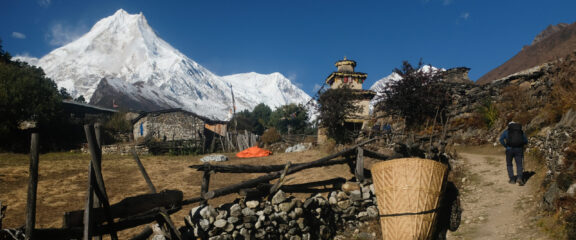

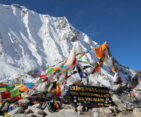
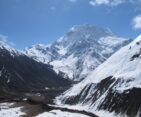


 How To Prepare Yourself For the Manaslu Circuit Trek?
How To Prepare Yourself For the Manaslu Circuit Trek?